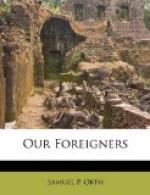[Footnote 43: According to the Census of 1910 there were 544,000 Italians in New York City]
[Footnote 44: The Census of 1910 gives the following distribution of the American white population by percentages:
------------------------+--------+-----------------+---
------ | | Native born | | Native | of Foreign or | Foreign Location | stock | mixed parentage | born ------------------------+--------+-----------------+--------
- Rural districts | 64.1 | 13.3 | 7.5 | | | Cities 2,500- 10,000 | 57.5 | 20.6 | 13.9 " 10,000- 25,000 | 50.4 | 24.6 | 17.4 " 25,000-100,000 | 45.9 | 26.5 | 20.2 " 100,000-500,000 | 38.9 | 31.3 | 22.1 " 200,000 and over | 25.6 | 37.2 | 33.6 ------------------------+--------+-----------------+--------
-
The native white element predominates in the country but is only a fraction of the population in the larger cities.]
CHAPTER IX
THE ORIENTAL
America, midway between Europe and Asia, was destined to be the meeting-ground of Occident and Orient. It was in the exciting days of ’49 that gold became the lodestone to draw to California men from the oriental lands across the Pacific. The Chinese for the moment overcame their religious aversion to leaving their native haunts and, lured by the promise of fabulous wages, made their way to the “gold hills.” Of the three hundred thousand who came to America during the three decades of free entry, the large majority were peasants from the rural districts in the vicinity of Canton. They were thrifty, independent, sturdy, honest young men who sought the great adventure unaccompanied by wife or family. Chinese tradition forbade the respectable woman to leave her home, even with her husband; and China was so isolated from the world, so encrusted in her own traditions that out of her uncounted millions even the paltry thousands of peasants and workmen who filtered through the port of Canton into the great world were bound by ancient precedent as firmly as if they had remained at home. They invariably planned to return to the Celestial Empire and it was their supreme wish that, if they died abroad, their bodies be buried in the land of their ancestors.
The Chinaman thus came to America as a workman adventurer, not as a prospective citizen. He preserved his queue, his pajamas, his chopsticks, and his joss in the crude and often brutal surroundings of the mining camp. He maintained that gentle, yielding, unassertive character which succumbs quietly to pressure at one point, only to reappear silently and unobtrusively in another place. In the wild rough and tumble of the camp, where the outlaw and the bully found congenial refuge, the celestial did not belie his name. He was indeed of another world, and his capacity for patience, his native dignity without suspicion of hauteur, baffled the loud self-assertion of the Irish and the Anglo-Saxon.




